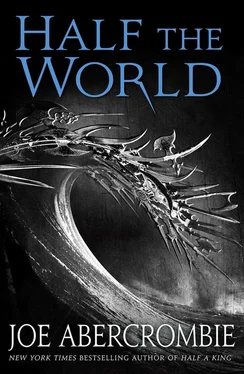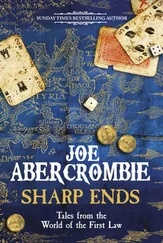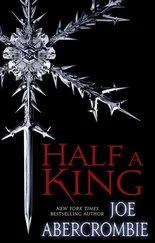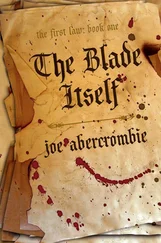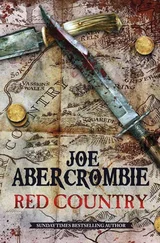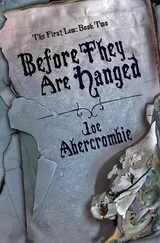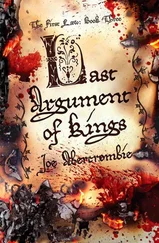Joe Abercrombie - Half the World
Здесь есть возможность читать онлайн «Joe Abercrombie - Half the World» — ознакомительный отрывок электронной книги совершенно бесплатно, а после прочтения отрывка купить полную версию. В некоторых случаях можно слушать аудио, скачать через торрент в формате fb2 и присутствует краткое содержание. Год выпуска: 2014, ISBN: 2014, Издательство: Del Rey, Жанр: Фэнтези, на английском языке. Описание произведения, (предисловие) а так же отзывы посетителей доступны на портале библиотеки ЛибКат.
- Название:Half the World
- Автор:
- Издательство:Del Rey
- Жанр:
- Год:2014
- ISBN:9780804178426
- Рейтинг книги:5 / 5. Голосов: 1
-
Избранное:Добавить в избранное
- Отзывы:
-
Ваша оценка:
- 100
- 1
- 2
- 3
- 4
- 5
Half the World: краткое содержание, описание и аннотация
Предлагаем к чтению аннотацию, описание, краткое содержание или предисловие (зависит от того, что написал сам автор книги «Half the World»). Если вы не нашли необходимую информацию о книге — напишите в комментариях, мы постараемся отыскать её.
Half the World — читать онлайн ознакомительный отрывок
Ниже представлен текст книги, разбитый по страницам. Система сохранения места последней прочитанной страницы, позволяет с удобством читать онлайн бесплатно книгу «Half the World», без необходимости каждый раз заново искать на чём Вы остановились. Поставьте закладку, и сможете в любой момент перейти на страницу, на которой закончили чтение.
Интервал:
Закладка:
But the gods knew he wasn’t much good at telling things, and the gods knew even better she wasn’t easy to tell things to, and the further it all dwindled into the past the harder it got. Didn’t seem like doing good, to put her in his debt that way.
So he stayed silent, and let her shoulder press against his instead, then felt her flinch as something heavy banged against the hull.
“Hail,” whispered Skifr. The rattling grew louder, and louder yet, blows like axes on shields, and the crew peered fearfully up, or shrank against the ground, or put hands over their heads.
“Look at this.” Fror held up a stone that had rolled under the boat, a spiked and knobbled chunk of ice the size of a fist. In the gloom outside the ship Brand could see the hail pounding the wet earth, bouncing and rolling.
“You think the gods are angry with us?” asked Koll.
“It is frozen rain,” said Father Yarvi. “The gods hate those who plan badly, and help those with good friends, good swords, and good sense. Worry less about what the gods might do and more about what you can, that’s my advice.”
But Brand could hear a lot of prayers even so. He’d have given it a go himself, but he’d never been much good at picking out the right gods.
Skifr was yammering away in at least three languages, not one of which he understood. “Are you praying to the One God or the many?” he asked.
“All of them. And the fish god of the Banyas, and the tree spirits of the Shends, and great eight-armed Thopal that the Alyuks think will eat the world at the end of time. One can never have too many friends, eh, boy?”
“I … suppose?”
Dosduvoi peered out sadly at the downpour. “I went over to the worship of the One God because her priests said she would bring me better luck.”
“How’s that worked out?” asked Koll.
“Thus far, unluckily,” said the big man. “But it may be that I have not committed myself enough to her worship.”
Odda spat. “You can never bow low enough for the One God’s taste.”
“In that she and Grandmother Wexen are much alike,” murmured Yarvi.
“Who are you praying to?” Brand muttered at Thorn, her lips moving silently while she clung to something on a thong around her neck.
He saw her eyes gleam as she frowned back. “I don’t pray.”
“Why?”
She was silent for a moment. “I prayed for my father. Every morning and every night to every god whose name I could learn. Dozens of the bastards. He died anyway.” And she turned her back on him and shifted away, leaving darkness between them.
The storm blew on.
READY OR DEAD
“Gods,” whispered Brand.
The elf-ruins crowded in on both sides of the river, looming towers and blocks and cubes, broken elf-glass twinkling as it caught the watery sun.
The Divine flowed so broad here it was almost a lake, cracked teeth of stone and dead fingers of metal jutting from the shallows. All was wreathed with creeper, sprouting with sapling trees, choked with thickets of ancient bramble. No birds called, not even an insect buzzed over water still as black glass, only the slightest ripple where the oar-blades smoothly dipped, yet Thorn’s skin prickled with the feeling of being watched from every empty window.
All her life she had been warned away from elf-ruins. It was the one thing on which her mother and father had always stood united. Men daily risked shipwreck hugging the coast of Gettland to keep their distance from the haunted island of Strokom, where the Ministry had forbidden any man to tread. Sickness lurked there, and death, and things worse than death, for the elves had wielded a magic powerful enough to break God and destroy the world.
And here they went, forty little people in a hollow twig, rowing through the midst of the greatest elf-ruins Thorn had ever seen.
“Gods,” breathed Brand again, twisting to look over his shoulder.
There was a bridge ahead, if you could call a thing built on that scale a bridge. It must once have crossed the river in a single dizzying span, the slender roadway strung between two mighty towers, each one dwarfing the highest turret of the citadel of Thorlby. But the bridge had fallen centuries before, chunks of stone big as houses hanging from tangled ropes of metal, one swinging gently with the faintest creak as they rowed beneath.
Rulf gripped the steering oar, mouth hanging wide as he stared up at one of the leaning towers, crouching as if he expected it to topple down and crush the tiny ship and its ant-like crew into nothingness. “If you ever needed reminding how small you are,” he muttered, “here’s a good spot.”
“It’s a whole city,” whispered Thorn.
“The elf-city of Smolod.” Skifr lounged on the steering platform, peering at her fingernails as though colossal elf-ruins were hardly worthy of comment. “In the time before the Breaking of God it was home to thousands. Thousands of thousands. It glittered with the light of their magic, and the air was filled with the song of their machines and the smoke of their mighty furnaces.” She gave a long sigh. “All lost. All past. But so it is with everything. Great or small, the Last Door is life’s one certainty.”
A sheet of bent metal stuck from the river on rusted poles, arrows sweeping across it in flaking paint, bold words written in unknowable elf-letters. It looked uncomfortably like a warning, but of what, Thorn could not say.
Rulf tossed a twig over the side, watched it float away to judge their speed and gave a grudging nod. For once he had to bellow no encouragements-meaning insults-to get the South Wind moving at a pretty clip. The ship itself seemed to whisper with the prayers, and oaths, and charms of its crew, spoken in a dozen languages. But Skifr, who had something for every god and every occasion, for once let the heavens be.
“Save your prayers for later,” she said. “There is no danger here.”
“No danger?” squeaked Dosduvoi, fumbling a holy sign over his chest and getting his oar tangled with the man in front.
“I have spent a great deal of time in elf-ruins. Exploring them has been one of my many trades.”
“Some would call that heresy,” said Father Yarvi, looking up from under his brows.
Skifr smiled. “Heresy and progress often look much alike. We have no Ministry in the south to meddle with such things. Rich folk there will pay well for an elf-relic or two. The Empress Theofora herself has quite a collection. But the ruins of the south have often been picked clean. Those about the Shattered Sea have much more to offer. Untouched, some of them, since the Breaking of God. The things one can find there …”
Her eyes moved to the iron-shod chest, secured by chains near the setting of the mast, and Thorn thought of the box, and the light from inside it. Had that been dug from the forbidden depths of a place like this one? Was there magic in it that could break the world? She gave a shiver at the thought.
But Skifr only smiled wider. “If you go properly prepared into the cities of elves, you will find less danger than in the cities of men.”
“They say you’re a witch.” Koll blew a puff of wood-chips from his latest patch of carving and looked up.
“They say?” Skifr widened her eyes so the white showed all the way around. “True and false are hard to pick apart in the weave of what they say .”
“You said you know magic.”
“And so I do. Enough to cause much harm, but not enough to do much good. So it is, with magic.”
“Could you show it to me?”
Skifr snorted. “You are young and rash and know not what you ask, boy.” They rowed in the shadow of a vast wall, its bottom sunk in the river, its top broken off in a skein of twisted metal. Rank upon rank of great windows yawned empty. “The powers that raised this city also rendered it a ruin. There are terrible risks, and terrible costs. Always, there are costs. How many gods do you know the names of?”
Читать дальшеИнтервал:
Закладка:
Похожие книги на «Half the World»
Представляем Вашему вниманию похожие книги на «Half the World» списком для выбора. Мы отобрали схожую по названию и смыслу литературу в надежде предоставить читателям больше вариантов отыскать новые, интересные, ещё непрочитанные произведения.
Обсуждение, отзывы о книге «Half the World» и просто собственные мнения читателей. Оставьте ваши комментарии, напишите, что Вы думаете о произведении, его смысле или главных героях. Укажите что конкретно понравилось, а что нет, и почему Вы так считаете.
